Over the years, the push for sustainable living and eco-friendly techniques has gained a lot of popularity. As the world faces the challenges of climate change and fossil fuel resources, it becomes crucial for individuals, businesses, and governments to adopt renewable energy sources. Among these alternatives, solar energy emerges as a leading solution to power the world while reducing our carbon footprint. In this blog, we will delve into the benefits of solar panels and explore how they are transforming both residential and commercial spaces into areas of sustainable living.
-
Harnessing the Sun’s Energy
At the core of solar solutions is the concept of converting sunlight into usable energy. Solar panels, also known as photovoltaic (PV) cells, are the essential components that achieve this feat. These panels are composed of materials that absorb photons from sunlight, releasing electrons and generating electricity in the process. This renewable and endless energy source ensures that we can harness the sun’s power without relying on natural resources or contributing to harmful emissions.
-
Environmental Benefits
The shift towards solar solutions has significant environmental benefits. Firstly, solar energy production is emission-free, meaning it does not release harmful greenhouse gases or other pollutants that contribute to climate change. By replacing traditional fossil fuels with solar power, we can significantly reduce our carbon footprint and reduce the effects of global warming.
Moreover, solar panels do not require extensive land use or cause habitat destruction, unlike some other renewable energy sources. Rooftop solar installations, for instance, use existing structures and make productive use of otherwise unused space. This approach further minimises the impact on natural landscapes and ecosystem
-
Financial Advantages for Homeowners
Residential solar solutions offer many financial advantages for homeowners. One of the most significant benefits is the potential to reduce or even eliminate electricity bills. When a solar system produces more energy than a household consumes, excess power can be fed back into the grid through net metering, earning homeowners credits or payments from utility companies. Over time, these savings can amount to significant sums, allowing families to distribute funds to other important aspects of their lives.
Additionally, many governments offer financial grants to encourage solar installation. Tax credits, rebates, and other grants also compensate for the initial investment, making solar installations more financially viable and appealing to homeowners.
-
Energy Independence and Resilience
With solar solutions, homeowners gain a sense of energy independence and stability. As they generate their electricity, they become less reliant on traditional energy grids and less vulnerable to power outages or price fluctuations in the energy market. In regions prone to natural disasters or grid disruptions, solar panels can provide a reliable source of energy, ensuring that basic niceties remain accessible.
-
Enhancing Property Value
Residential solar installations can increase the value of a property significantly. Studies have shown that homes equipped with solar panels tend to sell faster and at a premium compared to non-solar homes. Potential buyers are attracted to the prospect of lower energy costs, eco-friendly living, and the long-term savings that come with solar-powered homes. As the demand for sustainable living grows, solar-equipped properties become even more appealing in the housing market.
-
Sustainable Solutions for Commercial Spaces
Solar solutions expand beyond residential applications, with businesses and industries recognising the value of solar energy for their operations. Commercial solar installations offer many advantages, such as reduced operational costs and enhanced sustainability.
For businesses, the initial investment in solar panels is often tempted by significant savings in electricity expenses. As energy costs continue to rise, relying on solar energy can shield companies from the impact of fluctuating prices, improving financial stability and predictability.
Moreover, integrating solar power into a company’s operations showcases its commitment to sustainability and corporate responsibility. Greener businesses are increasingly valued by customers, investors, and partners, contributing to a positive brand image for the business in a competitive market.
-
Creating Green Jobs
The widespread installation of solar solutions also offers employment in the renewable energy sector. From manufacturing and installation to maintenance and research, solar energy supports a variety of skilled jobs. These green jobs promote economic growth while nurturing a skilled workforce dedicated to building a sustainable future.
Conclusion
Solar solutions offer benefits that make them an integral part of developing sustainable living practices. Whether on residential rooftops or commercial buildings, solar panels present a clean, renewable, and cost-effective source of energy. By embracing solar power, we can reduce our impact on the environment, save on energy costs, enhance property values, and promote economic growth. As we move towards a brighter future, solar energy will continue to be key in shaping a sustainable world for generations to come.

